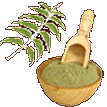For centuries millions of people have benefited
from using various parts of the neem tree. Its recognized
traditional uses are being confirmed by modern research findings.
During the last 20 years more than 2000 research papers have been
published on neem in journals, books and proceedings of
international congresses.
Neem tree in totality has been a village
dispensary and a qualified plant by itself. Every part of this plant
finds use as medicine for itching, skin disease, leprosy, blood
disorders, worms, diabetes, piles, dysentery, jaundice, vomiting,
wounds, eye disease, paraplegia, female genital diseases and all
kinds of fevers.
More than 150 compounds have been so far isolated
from neem. Out of these seed accord for 101 including 43 from the
malodorous fraction, the leaves 37; and flowers, bark and root
furnish the rest (Dhan Prakash et al, 1996).
Neem products are used for treatment of a whole
gamut of diseases, including skin infection, cardiovascular
disorder, diabities and cancer (Govindachari, 1992). It has
important fungicidal and Antimalarial properties. Nimbidin from neem
oil is effective in various skin diseases. Neem oil inhibits the
growth of all the three strains of Mycobacterium tuberculosis and M.
pyrogensn var. aures ( Chopra et al., 1956). The water extract (10%)
of leave shows antiviral activity. The gum from bark is a stimulant
and demulcent tonic. It possesses anti-leprosy, antispirochaetal,
and immenagogue properites (Nadkarni, 1954; Dastar, 1970;
Satyavarthi et al., 1976 ; Subramanian, 1986).
Some of its multiple applications are:
 • Birth control: Several studies showed that neem oil
appears to be a safe and very effective contraceptive, pre and post
coital (before and after sex). The way it was applied in the studies
it almost was 100% effective in preventing pregnancies. During in
vitro experiments, neem oil also totally immobilized sperm cells
within 20 to 30 seconds of being in contact with neem oil
<read more>.
• Birth control: Several studies showed that neem oil
appears to be a safe and very effective contraceptive, pre and post
coital (before and after sex). The way it was applied in the studies
it almost was 100% effective in preventing pregnancies. During in
vitro experiments, neem oil also totally immobilized sperm cells
within 20 to 30 seconds of being in contact with neem oil
<read more>.
• Psoriasis: In clinical studies Neem extracts and oil
were found to be as effective as coal tar and cortisone in treating
psoriasis. However there were none of the usual side effects
accompanying the use of Neem as there was with Coal tar and
cortisone. When applied to the skin, Neem extracts and oil removed
the redness and itching while improving the condition of the skin
for the duration of the treatment <read
more>.
• Diabetes: Whether drinking a simple cup of tea out
of the leaves or taking extracts of the Neem leaf, Neem
significantly and consistently reduced insulin requirements for
nonkeytonic, insulin fast, and insulin sensitive forms of Diabetes.
Because of the numerous and successful clinical studies with Neem on
Diabetes, the Indian equivalent of the FDA has approved the
manufacture and sale of Neem tablets, by Pharmaceutical companies,
for the treatment of Diabetes <read
more>.
• Dental disease: In the old days, the people in India
did not use neem toothpaste. They used neem toothbrushes instead.
Chewing on a neem twig has for many centuries been the commonly
preferred way to prevent gum disease and maintain healthy teeth.
In a study to determine the most effective method for reducing
plaque formation and the level of bacteria on tooth surfaces
researchers compared antibiotics to a number of plant materials with
known antibacterial properties, including neem. They found that
microorganisms found in inflamed gums and resistant to penicillin
(44%) and tetracycline (30%) but were not resistant to antibacterial
plant extracts like neem. And unlike antibiotics, antibacterial
plant extracts produced no allergy in the gingiva that could inhibit
their effectiveness.
• Cancer: For centuries in India and Southeast Asia
Ayurvedic practitioners and herbalists have successfully used Neem
to reduce tumors. Clinical research performed in Europe and India
using the polysaccharides and limonoids found in Neem bark, leaves,
and seeds demonstrated some remarkable effects against cancers.
These compounds not only reduced tumors and cancers but were also
effective against lymphocytic leukemia. An amazing reduction in
tumor size was reported when Neem extracts were injected around the
tumors.
• Herpes: Recent tests in Germany show that Neem is
toxic to herpes simplex viruses. Neem exhibits antiseptic,
anti-inflammatory, and astringent properties. The leaf and oil of
this tree has been used for centuries in Southern Asia for
maintaining beautiful and healthy skin
<read more>.
• Kidney stone: Taking neem tea is not only good to
prevent kidney stone, but also for the treatment against this
disease, helping to dissolve the stones.
• Dermatology: Neem's antibacterial and antiallergic
properties make it effective in tackling skin problems such as acne,
psoriasis and eczema. In Ayurveda, epidermal problems were believed
to be caused by raised sugar levels in the body and Neem's bitter
taste was said to balance out excess sugar. Besides, Neem cream is
an excellent anti-wrinkles <read more>.
• Allergies: Although Neem boosts immunity, Neem
doesn’t over - stimulate the immune system. Indeed, it may help
regulate an overactive immune system, minimizing allergic response
and inflammation.
• Ulcers. The traditional use of neem seed oil against
ulcers is well supported by in vivo laboratory evidence, both for
the protection of gastric and duodenal mucosa against stress-induced
or chemically induced lesions, and for the enhancement of the
healing process in chronic gastric lesions induced by acetic acid
(Pillai & Santhakumari 1984). Blockade of histamine receptors is
suggested as a possible mechanism for this effect.
• Hepatitis: Hepatitis is another disease helped by
neem. This often-deadly disease can be transmitted through blood or
by ingesting contaminated food or water. Recent studies indicate
that neem extracts can block infection by the virus that causes
hepatitis B virus.
• Fungus: Scientists have recently discovered that
alkaloids, nimbin and nimbidin found in Neem leaves, have
properties, which is why they have been effective in treating
athelete's foot, ringworm and yeast - like fungus infections.
• Malaria: There is significant phytochemical evidence
for the efficacy of neem leaf and seed extracts, and isolated
compounds, in the treatment of malaria, as reviewed by Van der Nat
et al., (1991a) and Willcox & Chamberlain (2003)
<read more>.
Agricultural Applications
<CLICK
HERE>
|
















